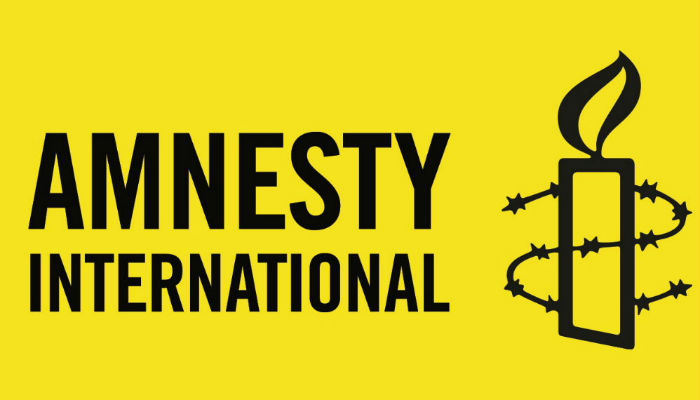Amnesty International has been criticized for overlooking systematic violations against people associated with Gülen movement, a faith-based group outlawed by Ankara, in its 2024 report on the global human rights situation.
The report, which highlights the dire consequences of escalating conflicts and the breakdown of international law around the world, deals with various legal issues in its Turkey section, from unlawful detentions to freedom of expression.
However, it conspicuously omits any mention of the hardships faced by people accused of ties to the Gülen movement, according to critics.
This is despite the Turkish government continuing to crack down on the group, which it blames for a 2016 coup attempt.
The Gülen movement, inspired by US-based Turkish cleric Fethullah Gülen, denies involvement in the coup attempt and describes itself as a peaceful civil society organization focused on education, charity and interfaith dialogue.
However, the Turkish government has classified it as a terrorist organization and has since arrested thousands of people associated with it, including journalists, academics and civil servants.
It seems, according to @aforgutu, the Turkish government has achieved its aim to exterminate Gulenists, so there's no need to mention them in its report. Check out the US State Department's report published two days ago for more details.#AmnestyInternationalvsUSDepartmentofstate https://t.co/sYFlVnKFDn pic.twitter.com/yrBdVgSdqQ
— Hakan Kaplankaya (@HKaplankaya) April 24, 2024
Human rights lawyer Hakan Kaplankaya took to social media to point out the omission, saying the Amnesty report failed to take into account the severe and ongoing persecution of members of the movement.
One conspicuous example is the plight of journalist Mehmet Kamış, a former deputy editor-in-chief of the now-closed Zaman newspaper, who was detained in November on terrorism and coup charges. Kamış, who had previously been convicted in absentia, faces several life sentences and additional years for alleged membership in a terrorist organization.
The lack of mention of Kamış in the report is particularly glaring, considering he is married to the sister of Taner Kılıç, a refugee rights lawyer and honorary chair of Amnesty International’s Turkey section.
The report covers a wide range of violations in Turkey, including violations of the freedoms of expression and assembly, as well as widespread discrimination against LGBTI people and refugees, particularly following devastating earthquakes in February 2023. The report also highlights economic hardship, such as the escalating cost of living, and environmental issues, such as Turkey’s vulnerability to climate change.
The report highlights the abuse of anti-terror and disinformation laws, restricted freedoms and discrimination against marginalized groups.
According to the report, human rights defenders, journalists and opposition politicians continue to face unfounded investigations and convictions, with freedom of expression severely restricted by legal measures. The earthquakes last February have exacerbated the situation and revealed inadequacies in the government’s response, particularly with regard to the rights and needs of people with disabilities.
The report notes that following the earthquakes, access to social media platforms such as Twitter and TikTok was restricted and authorities arrested people who had criticized the government’s handling of the crisis.
Among those affected was journalist Sinan Aygül, who was sentenced under the controversial Disinformation Act. Despite these challenges, the government has launched an aid program for millions of poor people, although critics argue that this does not address the wider systemic problems plaguing the country.
According to the report, peaceful assembly remains a contentious issue. Law enforcement agencies are reported to use excessive force against protesters and prevent public gatherings, including those advocating for environmental and human rights.
The report also highlights ongoing discrimination and violence against women, girls and LGBTI people, with stigmatizing rhetoric from high-ranking officials intensifying in the run-up to the presidential and parliamentary elections in May.
Refugees and migrants continue to face harsh conditions. Especially after the earthquakes, there were cases of unlawful repatriation and physical abuse. The report criticizes Turkey’s approach to refugees and accuses it of using migration management practices as a pretext for discrimination.
Amnesty International’s findings call for urgent reforms in Turkey and emphasize the need for international scrutiny and domestic policy changes to address systemic human rights violations and ensure the protection of all citizens and residents, regardless of their origin or faith.
Despite these extensive findings, the lack of coverage of the Gülen movement has sparked criticism from observers, who see this as a significant omission that undermines the report’s credibility in providing a full picture of Turkey’s human rights landscape.
Critics argue that this exclusion reflects a broader problem within international human rights reporting, where political sensitivities and prejudices can influence the portrayal of state actions against certain groups.
Turkish Minute contacted the Turkey section of Amnesty International for comment but was unable to reach anybody.
The 2023 Country Reports on Human Rights Practices released by the US State Department has highlighted a broad spectrum of human rights abuses in Turkey, detailing ongoing issues including enforced disappearances, torture, arbitrary detentions and significant infringements on freedom of expression and the media, particularly targeting journalists and critics of the government.
A focal point of rights abuse in the country continues to be the alleged members of the Gülen movement, according to the report, with 15,539 individuals accused of links to the group imprisoned as of July 2023 and many subjected to mistreatment and lacking due process. The report points to a broader pattern of transnational repression and misuse of international law enforcement tools by Turkey against members of the group.

